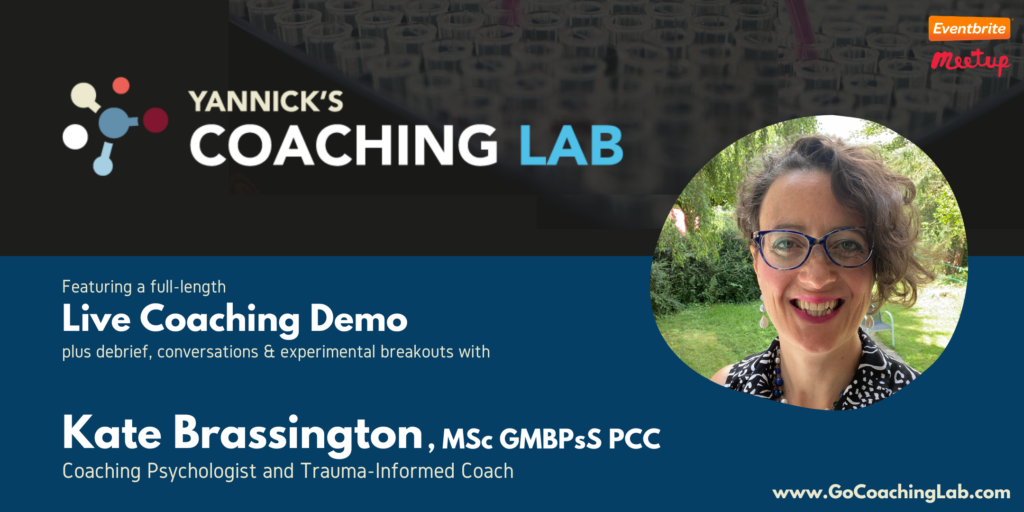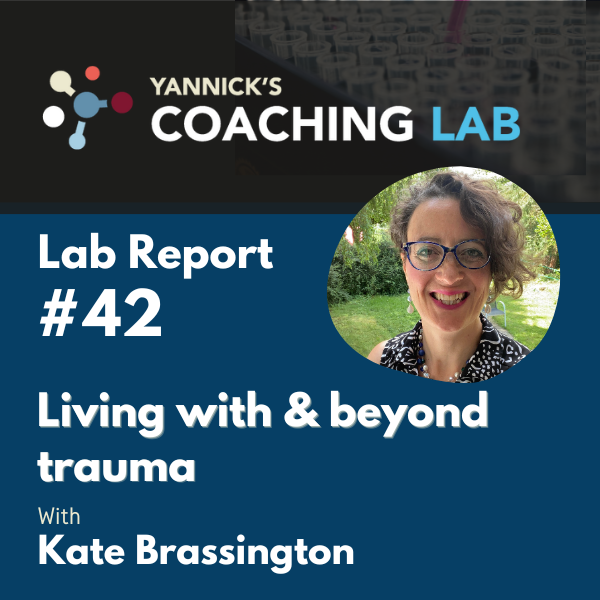
Yannick’s Coaching Lab features guest coaches from a broad variety of approaches, who showcase how they work as part of a live 45min coaching session, followed by reflections and Q&A with the audience.
Curious to know what this session was like? Have a peek at the Lab Report below or consider VIP membership to access the full recording of this and many more exciting sessions.
Yannick’s Coaching Lab #42 — Kate Brassington
Lab Report by Natalie Fraser
Summary
Kate’s mission as a coaching psychologist is to “ease the suffering and bring the fun back”. She has a masters degree in Applied Positive Psychology and Coaching Psychology and has trained extensively in different trauma approaches including Polyvagal theory and Internal Family Systems (parts work). Kate was in the military and has worked with veterans who have experienced extreme trauma.
During her training she noticed a reoccurring message that “we don’t work with trauma because we’re coaches”, but that most of the time when we coach “trauma is already in the room”. Kate offers the insight that the WHO 2016 did a worldwide study that 7/10 adults have been exposed to at least one traumatic event. While this does not equal traumatization, and only 9% are actually diagnosed with a trauma-related diagnosis, Kate recognizes that this leaves a significant part of the population who have had some kind of trauma exposure, so that it is almost inevitable that coaches find themselves confronted with its effects.
The client in this lab is the same client as in last month’s lab with Mulika (which can be accessed via the Coaching Lab Vault). While it was interesting to see both styles in comparison, the session was able to stand on its own.
Thourghout her life, the client had received support from friends and professionals, yet this has often felt less helpful than supporting herself. Finding her own strategies to cope and being ‘fine’ has been important. Simultaneously, she sensed that some support is missing. The client was diagnosed with breast cancer at the start of covid isolation, mentioned sexual abuse in her younger years, her best friend died of cnacer last year, and she very recently had found out about a rare terminal illness in two of her young relatives. She experiences a back and forth between her ‘real’ self that is grounded which experiences no issues, and another part of her which feels it should explore what is going on. The client senses a connection between not exploring their pain and developing illness. She puts herself under pressure not to become ill to prevent this harming or hurting her loved ones, prioritizing being strong for them, not for herself.
She came to coaching because she is familiar with Kate’s work and wanted to take steps to manage the ins and outs of her day-to-day life better (such as being able to go to the supermarket without feeling disorientated and to engage in everyday social exchanges, which tend to feel trivial and even upsetting to her.
Key Insights
Kate sends pre-lab questions such as “what is the issue you’re facing?” “how does this show up in daily life?” “What have you explored or tried so far, how did this turn out?” for their new client to tune into and prepare them for the coaching space. For the client, this helped them make sense of some things and gave them focus for the session, but also an awareness that they wanted to demonstrate what was going well in spite of their challenges.
Kate started the session by contracting, drawing attention to this being a private space to share only what her client wants to, that she can ask her coach anything, and that she is not responsible for taking care of the coach or lab audience.
A polyvagal inspired grounding exercise began the session, using the five senses to tune into what the nervous system was picking up about safety or threat, co-regulating the coach and client. Kate included little psychoeducation points during this to increase their client’s insight into how this exercise worked.
“Has there ever been a time when you couldn’t be…” was a powerful question that gave space for the client to recognize what drives them to uphold the roles that she generally finds herself in, such as being strong for everyone.
The musts in the clients life were explored, recognizing what aspects of their identity and way of life are not perceived as an option.
What do you want to get out of this coaching session? To understand more clearly what I can do practically to move forward. What is holding me back? Is there something else I can do?
Kate made space for a “wee” [little] breather, reminding her client that her breath is her best friend and re-co-regulating the space.
Two worlds were identified: ‘the highlander’ which is out there and strong, and ‘the cave’ which withdraws to sort herself out in private. To integrate or not to integrate became the question concerning these parts. Not pushing the parts back together was an important choice of the coach, putting the idea on the table and suggesting it as a possibility whilst respecting why the client may keep them apart.
Kate shared a little Polyvagal Theory with her client’s consent to offer understandings relevant to their situation, specifically recognizing the ‘therapeutic disconnected state’ and addressing the challenges of being in this state for a prolonged time.
“Get your yoga off your mat and into your life” is a statement regularly used by Kate with her clients, reminding them to bring their Zen into their daily life.
Key Take-Aways
Kate’s “bubbly” and light-hearted coaching style was valued by the client, who found that it created a safe space and prevented her from being scared to explore painful issues.
Being really seen by the coach who found parts of herself that she’d not identified was a valuable part of this session for the client.
“The hero never really sees themselves in their own story because they’re too preoccupied living it” Kate offered
The coach vs lamppost study was raised to remind of the power of silence and clients worthing through their issues themselves.
Kate actively uses questions which ‘dance around’ themes rather than directly articulate them. For example, not asking “Why are you the one who has to take responsibility for everyone?” but rather acknowledging that this is an important protective part and giving space for it to be explored from different directions.
Kate suggested that if a client can’t identify where a part of them comes from, it likely developed in very early stages of life.
Kate believes that exploring one’s role, skills, training, and boundaries is fundamental working as a coach with trauma.
Watch the recording of this session by joining the Lab as a member: www.GoCoachingLab.com
A list of all available recordings can be found at https://bit.ly/LabRecordings
This Lab Report was authored by Natalie Fraser
Natalie is an existential Counselling Psychologist, specialising in trauma and transformation, and curious about coaching. Interested in exploring life’s Big Questions? Find out more at: www.existentialofferings.com

